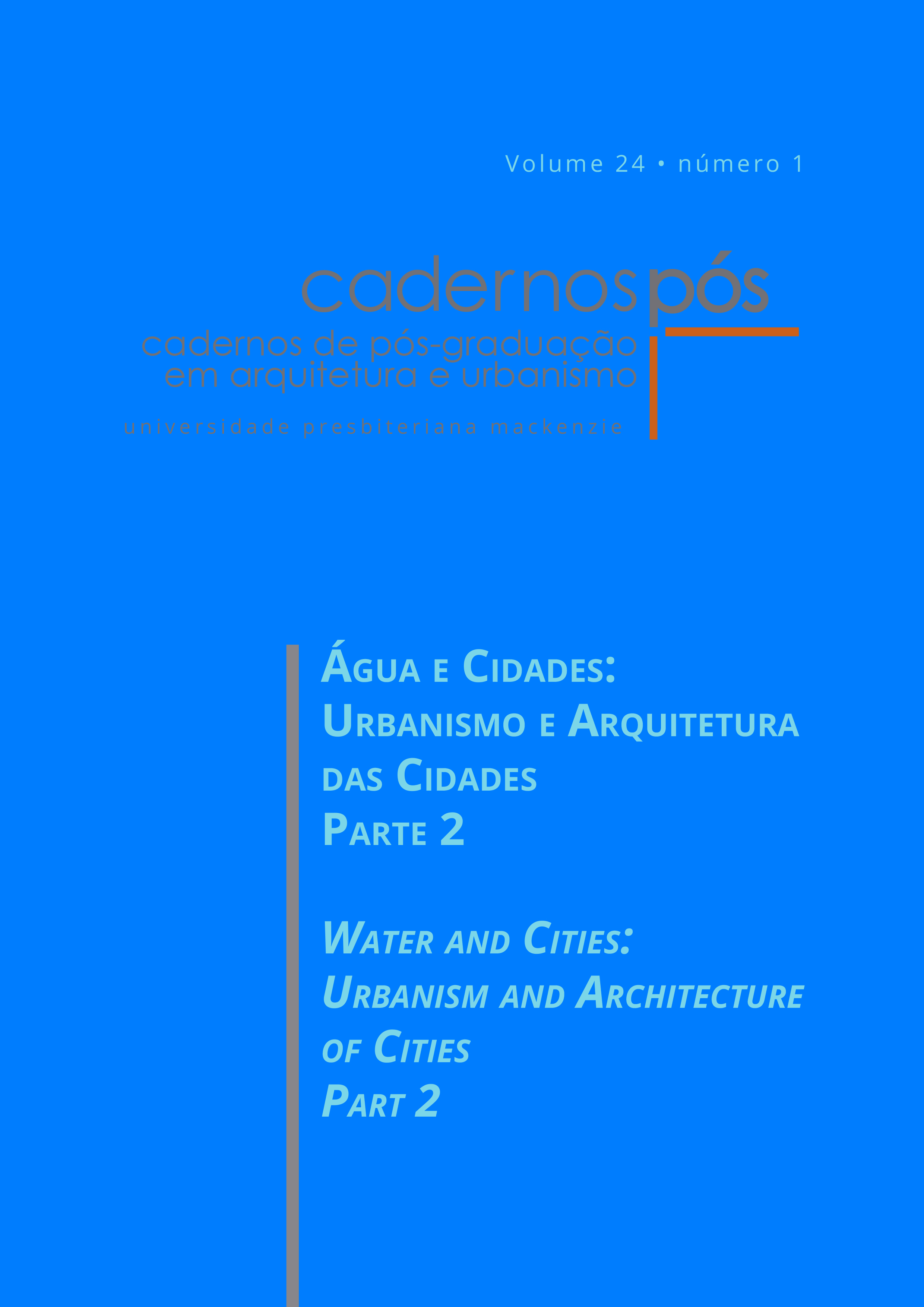Possible Gardens and the waters in the city
research and teaching
DOI:
https://doi.org/10.5935/cadernospos.v24n1p169-184Keywords:
Multispecies; Possible Gardens; Cosmopolitics; Teaching; Research.Abstract
Water is an essential element of life but it is neglected in cities. Understanding its importance in space production for life, the article purpose is to discuss how research and teaching of architecture and urbanism has the potential to contribute to this debate. This discussion starts from questions raised by the multispecies research Possible Gardens that understand that it is necessary to overcome the anthropocentric character of projects. Some ideas are mobilized for the proposed discussion: possible gardens, multispecies, cosmopolitics, rights granted to non-humans. It is presented how gardens contribute to make water perceived in city, from everyday life, with special interest in its agency and its importance for drainage. From this understanding, didactic experiments are presented to propose projects that place water as central. As a conclusion, it brings the importance of everyday spaces for water cycles, the need to expand water imaginaries and points to cosmopolitical assemblies as an example.
Downloads
References
BERARDI, F. Futurabilidad: la era de la impotência y el horizonte de posibilidad. Buenos Aires: Caja Negra, 2019.
BRAGANÇA, L. S. Jardins como possibilidade. Rio de Janeiro: Paisagens Híbridas, 2023a. (Coleção Jardins Possíveis).
BRAGANÇA, L. S. Possible Gardens: cosmopolitical worlds. Front. Environ. Sci. 11:1234178. DOI 10.3389/fenvs.2023.1234178, 2023b.
CARVALHO, E. T. Geologia urbana para todos: uma visão de Belo Horizonte. 2. ed. rev. Belo Horizonte: do autor, 2001.
COSTA, H. S. M. Meio ambiente e desenvolvimento: um convite à leitura. In: HISSA, C. E. V. (org.). Saberes ambientais: desafios para o conhecimento. Belo Horizonte: Editora da UFMG, 2008. p. 79-107.
HERZOG, C. P. Cidade para todos: reaprendendo a conviver com a natureza. Rio de Janeiro: Mauad, 2013.
LATOUR, B. Diante de Gaia: oito conferências sobre a natureza no antropoceno. São Paulo: Ubu, 2020.
MAGALHÃES, C. O desenho da história no traço da paisagem: patrimônio paisagístico e jardins históricos no Brasil – memória, inventário e salvaguarda. 2015. Tese (Doutorado em História) – Instituto de Filosofia e Ciências Humanas, Universidade Estadual de Campinas, Campinas, 2015.
MIGNOLO, W. Histórias locais, projetos globais. Belo Horizonte: Editora da UFMG, 2003.
MONGIN, O. Les jardins front la ville. Rio de Janeiro: Fundação Total, 2013.
OYĚWÙMÍ, O. Jornada pela academia: filosofia africana. 2018. Disponível em: https://filosofia-africana.weebly.com/textos-africanos.html. Acesso em: 28 jan. 2022.
PINSKY, J. As primeiras civilizações. São Paulo: Contexto, 2001.
SENOS, J. Pensamento contrafactual e raciocínio causal: efeito de facilitação recíproca e modelo de integração. Lisboa: UNL, 2008.
SODRÉ, M. Claros e escuros: identidade, povo e mídia no Brasil. Petrópolis: Vozes, 1999.
STENGERS, I. A proposição cosmopolítica. Revista do Instituto de Estudos Brasileiros, n. 69, p. 442-464, 2018.
TSING, A. Viver nas ruínas: paisagens multiespécies no Antropoceno. Brasília: IEB Mil Folhas, 2019.
Downloads
Published
How to Cite
Issue
Section
License
Copyright (c) 2024 Luciana Bragança

This work is licensed under a Creative Commons Attribution 4.0 International License.
Authors who publish in this journal agree to the following terms:
a) Authors retain the copyright and grant the journal the right of first publication, with the Project simultaneously licensed under the Creative Commons Attribution License that allows the sharing of the Project with recognition of the authorship and initial publication in this journal.
b) Authors are authorized to assume additional contracts separately for the non-exclusive distribution of the version of the Project published in this journal (e.g., publishing in an institutional repository or as a book chapter), indicating that it was originally published in this journal, with a link to the article.








 Todo o conteúdo de Cadernos de Pós-Graduação em Arquitetura e Urbanismo está licenciado sob
Todo o conteúdo de Cadernos de Pós-Graduação em Arquitetura e Urbanismo está licenciado sob 